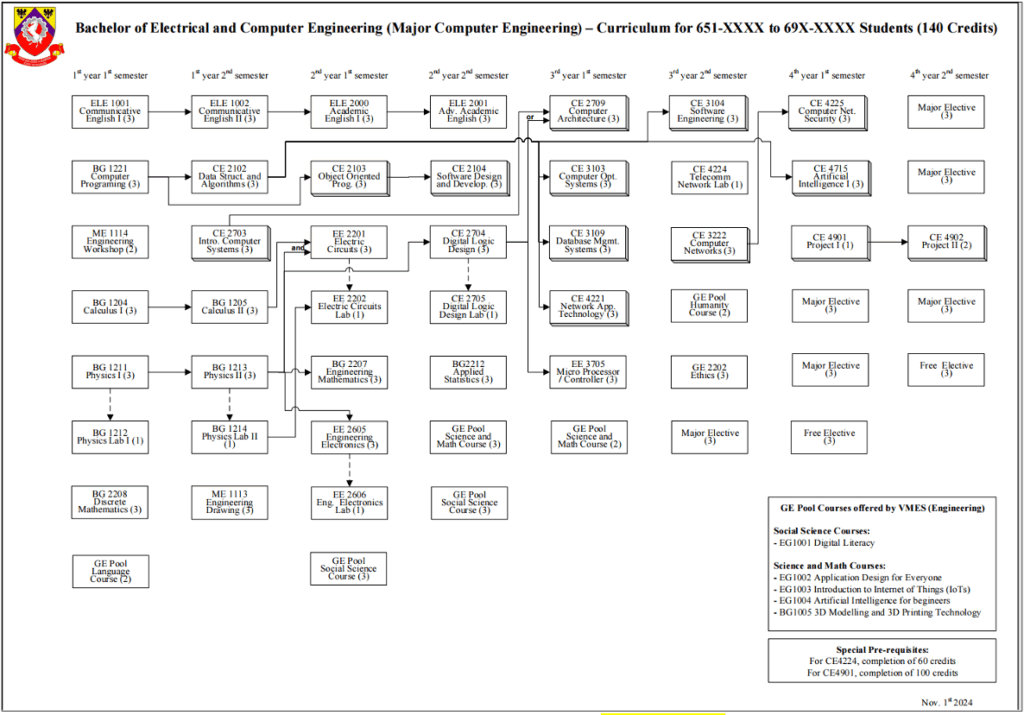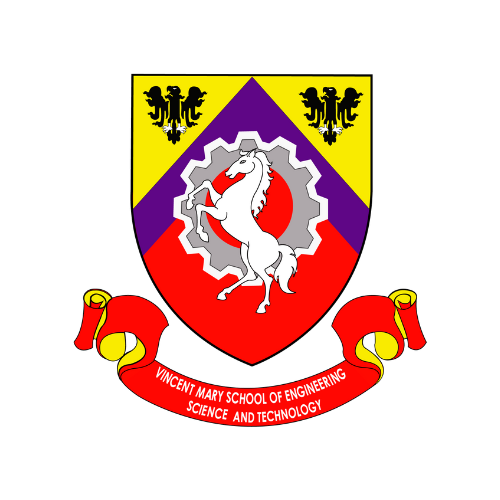Computer Engineering (CE)
Index of Contents
- Overview of Computer Engineering (CE)
- Trends/Careers in Computer Engineering (CE):
- Curriculum Structure
- Study Plan (Flow Chart)
- Course Credit and Numbering System
- List of Subjects in the Curriculum
- Graduation Requirements
- Admissions Requirements
- Tuition Fees
1. Overview of Computer Engineering (CE)
This engineering program is for those who have a passion for learning the myriad computer programming languages. VME CE students will learn various hot topics such as Artificial Intelligence (AI), Internet of Things (IoT), Computer Architecture, Web/App Development, etc., with an understanding of Network Design and Architecture to support it.

2. Trends/Careers in Computer Engineering (CE)
- Artificial Intelligence (AI) and Data Engineer: CE4715/6, Artificial Intelligence I + II, CE4114 Data Mining, CE4304 Prog. for Data
Analytics, CE4201 Image Processing and Computer Vision. - IoT / Embedded System Engineer: CE4301 Fundamental of Internet of Things (IoT), EE3704 Embedded Systems, EE3705, Micro
Processor/Controller, CE2704/5, Digital Logic Design + Lab.

- Software (Games, App) Developer / Engineer: CE2104 Software Design and Development, CE3104 Software Engineering, CE3003
Mobile App. Development, CE3109 Database Mgmt. Systems. - Network and Security Specialist / Engineer: CE3222 Computer Networks, CE4224, Telecomm Network Lab, CE4225 Computer
Network Security, CE4221 Network App. Technology.

3. Curriculum Structure (CE)
| A. General Education | 30 credits |
| B. Basic Engineering Courses | 53 credits |
| C. Major Required Courses | 33 credits |
| D. Major Elective Courses | 18 credits |
| E. Free Elective Courses | 6 credits |
| Total | 140 credits |
4. Study Plan (Flow Chart)

5. Course Credit and Numbering System
All courses are identified by a course ID. For example, “GE 2202” is the course ID for the “Ethics” course. Additionally, every course is assigned a credit number. One credit hour requires a minimum of 15 hours of class attendance. A subject of 3 credit hours will require at least 45 hours in class. To qualify for the final examination in any subject, each student must have at least 80% of class attendance. In some exceptional cases, at the discretion of the Lecturer and/or the Dean of the Faculty concerned, this requirement may be waived. All courses are assigned a four-digit number with the following format: Credits (Lecture-Lab-Self-Studying)
Therefore, GE 2202 Ethics has 3 credits (requires 3 × 15 = 45 hours in class). The three numbers in parentheses (3-0-6) would mean that the course has 3 hours of lecture, zero hours of laboratory, and expects 6 hours of self-studying.
6. List of Subjects in the Curriculum and Categorization
A. General Education (30 credits):
- ELE 1001 Communicative English I 3 (2-3-6)
- ELE 1002 Communicative English II 3 (2-3-6)
- ELE 2000 Academic English 3 (2-3-6)
- ELE 2001 Advanced Academic English 3 (2-3-6)
- GE 2202 Ethics 3 (3-0-6)
- GE Pool (Language Course, 2 credits; students select one of the courses below):
- GE 1410 Thai for Professional Communication 2 (2-0-4) (For Thai students), or
- GE 1411 Thai Language for Multicultural Communication 2 (2-0-4) (For non-Thai students), or
- GE 1412 Introductory Thai Usage 2 (2-0-4) (For Thai students from international programs)
- GE Pool (Social Science Courses, 6 credits; students select two of the courses below)
- EG 1001 Digital Literacy 3 (3-0-6)
- GE 1209 Psychology Application in Daily Life 3 (3-0-6)
- GE 2207 Sport, Health and Wellness Development 3 (3-0-6)
- GE Pool (Science and Math Courses, 5 credits; students select two of the courses below)
- EG1002 Application Design for Everyone (3-0-6)
- EG1004 Artificial Intelligence for Beginners (3-0-6)
- BBA 1028 The Art of Data Essentials 2 (2-1-4)
- GE 1303 Science for Sustainable Future 2 (2-0-4)
- GE Pool (Humanities Course, 2 credits; students select one of the courses below)
- ADX1102 Design Culture Exposure 2 (0-4-4)
- FT2003A Foods Changing the World (Part A) 2 (2-0-4)
Click here for the entire list of GE Pool subjects
B. Basic Engineering Courses (53 credits):
- BG 1204 Calculus I 3 (3-0-6)
- BG 1205 Calculus II 3 (3-0-6)
- BG 1211 Physics I 3 (3-0-6)
- BG 1212 Physics Laboratory I 1 (0-3-2)
- BG 1213 Physics II 3 (3-0-6)
- BG 1214 Physics Laboratory II 1 (0-3-2)
- BG 1221 Computer Programming 3 (3-0-6)
- BG 2207 Engineering Mathematics 3 (3-0-6)
- CE 2704 Digital Logic Design 3 (3-0-6)
- CE 2705 Digital Logic Design Laboratory 1 (0-3-2)
- EE 2201 Electric Circuits 3 (3-0-6)
- EE 2202 Electric Circuits Laboratory 1 (0-3-2)
- EE 2605 Engineering Electronics 3 (3-0-6)
- EE 2606 Engineering Electronics Laboratory 1 (0-3-2)
- EE 3705 Microprocessors and Microcontrollers 3 (3-0-6)
- ME 1113 Engineering Drawing 3 (2-3-6)
- ME 1114 Engineering Workshop 2 (0-4-2)
- BG 2208 Discrete Mathematics 3 (3-0-6)
- BG 2212 Applied Statistics 3 (3-0-6)
- CE 2102 Data Structures and Algorithms 3 (3-0-6)
- CE 3222 Computer Networks 3 (3-0-6)
- CE 4224 Telecommunication Network Laboratory 1 (0-3-2)
C. Major Required Courses for Electrical (33 credits):
- CE 2103 Object-Oriented Programming 3 (3-0-6)
- CE 2104 Software Design and Development 3 (3-0-6)
- CE 2703 Introduction to Computer Systems 3 (3-0-6)
- CE 2709 Computer Architecture 3 (3-0-6)
- CE 3103 Computer Operating Systems 3 (3-0-6)
- CE 3104 Software Engineering 3 (2-3-6)
- CE 3109 Database Management Systems 3 (3-0-6)
- CE 4221 Network Applications and Technology 3 (3-0-6)
- CE 4225 Computer and Network Security 3 (3-0-6)
- CE 4715 Artificial Intelligence I 3 (3-0-6)
- CE 4901 Computer Engineering Project I 1 (0-3-2)
- CE 4902 Computer Engineering Project II 2 (0-6-3)
D. Major Elective Courses (18 credits)
- CE 3003 Mobile Applications Development 3 (3-0-6)
- CE 4114 Data Mining 3 (3-0-6)
- CE 4115 Fundamentals of Machine Learning 3 (3-0-6)
- CE 4201 Image Processing and Computer Vision 3 (3-0-6)
- CE 4229 Introduction to Cloud Computing 3 (3-0-6)
- CE 4301 Fundamentals of Internet of Things 3 (3-0-6)
- CE 4302 Introduction to Big-Data 1 (0-3-2)
- CE 4716 Artificial Intelligence II 3 (3-0-6)
- CE 4907 Computer Engineering Industrial Training 3 (3-0-6)
- EE 3704 Embedded Systems 3 (3-0-6)
- EE 4403 Basic Mechatronics 3 (3-0-6)
- MCE 4102 Introduction to Industrial Automation 3 (3-0-6)
- (Choose six subjects from the above list)
Click here for the entire list of Major Elective subjects
E. Free Elective Courses (6 credits)
- CE 1000 Digital Literacy for Engineers 3 (3-0-6)
- EE 1000 Basic Engineering Tools 3 (3-0-6)
- Students can take the free elective courses from any faculty at AU.
7. Graduation Requirements
Assumption University confers the degree of Bachelor of Engineering in Aeronautic Engineering upon students who meet all of the following requirements specified in the Graduate Program Standard Criteria B.E. 2548 and Assumption University Bylaw B.E. 2548 as follows:
- To have completed the total number of credits of the curriculum.
- To have obtained a cumulative grade point average of at least 2.00.
- Have met the minimum English proficiency requirement specified in one of the following criteria:
- AU English Proficiency Assessment 70% or
- TOEFL (iBT) 90 or
- TOEFL (P) 575 or
- IELTS 6.5
- To have participated in 16 sessions of the Professional Ethics Seminar.
- To have obtained library and financial clearance from the University.
- To have demonstrated good-behavior and discipline.
8. Admissions Requirements
- Applicants with any of the following qualifications are eligible to apply :
- High School Transcript and Graduation Diploma
- I.G.C.S.E./G.C.S.E./G.C.E. “O” level graduation diploma, then at least 5 subjects and GCE ‘A’ Level or GCE ‘AS’ Level at least 3 subjects, 8 subjects in total with a grade of no less than “C” cannot be repeated at the same level.
- GED Transcript and Diploma, then at least 4 subjects with scores no less than 145, total scores no less than 580.
- IB certificate in at least 5 subjects with grades no less than 4.
- Certificate of Education and statement of results, which are issued by the Australian Qualifications Framework for applicants who have graduated from Australia.
- Other equivalent certificates or diplomas, as authorized by the Ministry of Education.
- Applicants must be free from infectious diseases or other handicaps that can hinder their study
- Applicants must be able to bear all expenses related to their studies.
- Applicants must have good manners and testify to the university that they will be attentive, make the fullest use of their capabilities in their studies, and strictly conform to the university’s rules and regulations.
Remark: If your diploma and transcript are in a language other than English, they must be translated to English and certified by their own government’s Ministry of Education, Foreign Ministry, or Embassy or issued in English by their graduated school confirming that graduates of these programs are eligible to apply to regular full-time programs worldwide.
Admission for Non-Thai Students
Accepted non-Thai applicants will be provided further information once their applications are received, and format acceptance letters will be sent to be used mainly to obtain Non-Immigrant Visas from the Royal Thai Embassy or Consulate nearest to their home. The university arranges an extended visa for full-time students (“Full time” means they are taking 12 credits or more per semester).
Note: A Tourist visa is not acceptable. Entering Thailand without the proper visa necessitates exit and reentry. Note 2: If found lacking in any of the conditions listed above, the applicant will have his or her admission declined, or his or her student’s status will be nullified immediately.
Tuition Fees
Enrollment and Intensive Course Fees
| Enrollment and Intensive Course Fees | 1st Year | 2nd Year | 3rd Year | 4th Year | Total | |
|---|---|---|---|---|---|---|
| Price (THB) | 11,500- 32,550 | 149,100 | 151,800 | 118,900 | 114,950 | 546,250 |
Note: Prices are in Thailand local currency – Thai Baht (THB). More detailed information is provided in AU Bulletins, which are updated every academic semester.



